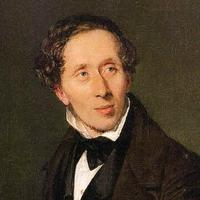The naughty boy, part 2
The naughty boy, to shoot the old poet in that way; he who had taken him into his warm room, who had treated him so kindly, and who had given him warm wine and the very best apples!
The poor poet lay on the earth and wept, for the arrow had really flown into his heart.
"Fie!" said he. "How naughty a boy Cupid is! I will tell all children about him, that they may take care and not play with him, for he will only cause them sorrow and many a heartache." And all good children to whom he related this story, took great heed of this naughty Cupid; but he made fools of them still, for he is astonishingly cunning. When the university students come from the lectures, he runs beside them in a black coat, and with a book under his arm. It is quite impossible for them to know him, and they walk along with him arm in arm, as if he, too, were a student like themselves; and then, unperceived, he thrusts an arrow to their bosom. When the young maidens come from being examined by the clergyman, or go to church to be confirmed, there he is again close behind them. Yes, he is forever following people. At the play, he sits in the great chandelier and burns in bright flames, so that people think it is really a flame, but they soon discover it is something else. He roves about in the garden of the palace and upon the ramparts: yes, once he even shot your father and mother right in the heart. Ask them only and you will hear what they'll tell you. Oh, he is a naughty boy, that Cupid; you must never have anything to do with him. He is forever running after everybody. Only think, he shot an arrow once at your old grandmother! But that is a long time ago, and it is all past now; however, a thing of that sort she never forgets. Fie, naughty Cupid! But now you know him, and you know, too, how ill-behaved he is!

